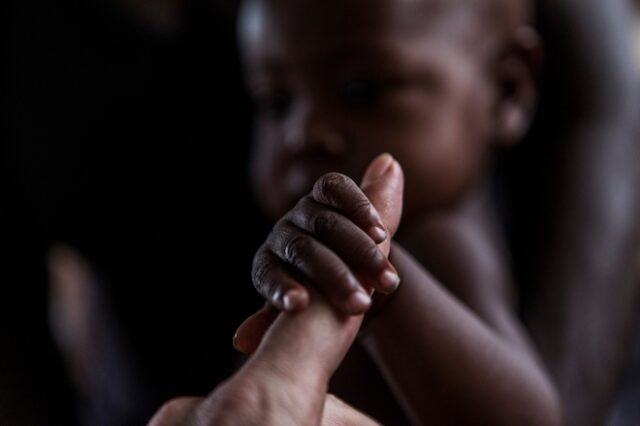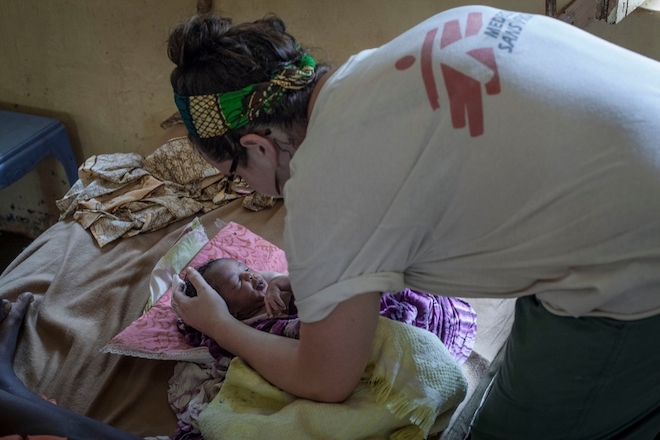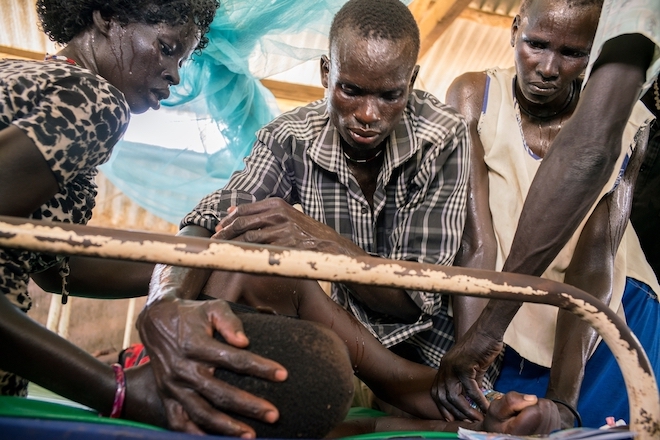Νότιο Σουδάν: Ένας ύμνος για τη ζωή στη Μονάδα Εντατικής Θεραπείας των Γιατρών Χωρίς Σύνορα

Μία παιδίατρος μοιράζεται τις πιο βαθιά συναισθηματικές στιγμές που έζησε σε Μονάδα Εντατικής Θεραπείας στο Σουδάν και δεν θα ξεχάσει ποτέ.
- 27 Μαρτίου 2021 07:16
Από την πόλη Aweil του Νοτίου Σουδάν, η παιδίατρος, Madeleine Finney – Brown, μοιράζεται τις πιο βαθιά συναισθηματικές στιγμές που έζησε εκεί και δεν θα ξεχάσει ποτέ.
Κάθε πρωί ξεκινάω τις επισκέψεις μου στο νοσοκομείο από τη Μονάδα Εντατικής Θεραπείας, όπου νοσηλεύονται τα πιο σοβαρά άρρωστα παιδιά.
Οι μικροί ασθενείς που εισάγονται εκεί συχνά βρίσκονται στα πρόθυρα του θανάτου και η εξειδικευμένη ομάδα κάνει ό, τι μπορεί για να τους βοηθήσει.
Εκείνη τη μέρα, μπαίνω στην μονάδα και βρίσκω έναν ασθενή στο κρεβάτι ανάνηψης.
Ο Deng * είναι ένα επτάχρονο αγόρι που έχει εισαχθεί με εγκεφαλική ελονοσία και ανεξέλεγκτες επιληπτικές κρίσεις.
Του χορηγήθηκε φάρμακο που χρησιμοποιείται για τη θεραπεία των επιληπτικών κρίσεων. Ωστόσο, τώρα αναπνέει με δυσκολία, το επίπεδο οξυγόνου και ο καρδιακός παλμός του είναι και σε πολύ χαμηλά επίπεδα.
Αυτή είναι μία συνηθισμένη ένδειξη, όταν ένας ασθενής πρόκειται να υποστεί καρδιακή ανακοπή.
Ίσως φταίει η εγκεφαλική ελονοσία, ίσως είναι μια αντίδραση στα φάρμακα που του χορηγήθηκαν για να σταματήσουν οι επιληπτικές κρίσεις του – δεν μπορούμε να είμαστε σίγουροι.
Παίρνουμε την απόφαση να ενισχύσουμε την αναπνοή του παιδιού με μια χειροκίνητη συσκευή οξυγόνου. Λίγο μετά την έναρξη της διαδικασίας, ο Deng σταματά να αναπνέει.
Ο κορεσμός του οξυγόνου και ο καρδιακός παλμός ευτυχώς επανέρχονται άμεσα. Ωστόσο, ο μικρός δεν μπορεί να αναπνεύσει πλέον μόνος του.
Η ζωή του Deng βρίσκεται κυριολεκτικά στα χέρια μας.
There are 20 to 25 international MSF staff on the team and some 340 national staff working for MSF. The Ministry of Health has four doctors and the Aweil hospital caters for a population of up to 1.4 million.
The maternity ward delivers on average 15 to 20 babies every day and also run a premature infants ward were they can only admit babies weighing 1.25kg or more given the limited facilities available to care for premature cases.
MSF also run an in-patient Malaria ward at Aweil hospital and outreach community services for Malaria treatment across the region.
Northern Bahr el Ghazal saw catastrophic rates of Malaria this season; four times the rates of last year and far higher than the worst year in recent records (2012). Malaria accounted for around 75 percent of their hospital admissions in 2014.
The Aweil hospital has treated more than 20,000 Malaria patients since June 2014 with August, September and October the peak months for infection.”>
Dans la province du Nord Bahr El Ghazal au Soudan du Sud, MSF dispense des soins de santé materno-infantile dans l?hôpital de référence d?Aweil depuis 2008. Entre mai 2012 et mars 2013, 4,708 enfants ont ainsi été admis dans le service pédiatrique de l?hôpital et 2,590 autres souffrant de malnutrition sévère dans le programme nutritionnel. MSF a également assisté 3,125 accouchements à l?hôpital, dont 133 césariennes (4%), pour un total de 5,522 femmes admises dans le service de gynécologie/obstétrique.
In the North Bahr El Ghazal province of South Sudan, MSF provides maternal and child health care in the Aweil referral hospital since 2008. Between May 2012 and March 2013, 4,708 children have been treated in the pediatric ward of the hospital and 2,590 severely malnourished in the nutrition program. MSF also assisted 3,125 hospital deliveries, including 133 cesarean sections (4%), for a total of 5,522 women admitted to the Ob/Gyn department.”>
Οι δυσκολότερες συζητήσεις
Το πρόβλημα είναι ότι δεν διαθέτουμε μηχάνημα αναπνευστικής υποστήριξης, ούτε επαρκές προσωπικό για να επιτρέψουμε σε ένα άτομο να βρίσκεται συνεχώς δίπλα από έναν ασθενή για όσο χρειάζεται.
Βοηθάμε τον Deng να αναπνεύσει για σχεδόν 20 λεπτά και ακόμη δεν αναπνέει μόνος του.
Ζητώ από τον διερμηνέα να με βοηθήσει ώστε να κάνω την πιο δύσκολη κουβέντα με τη μητέρα του, η οποία παρακολουθεί με αγωνία.
«Το αγόρι σου δεν αναπνέει μόνο του … Έχουμε κάνει ό, τι μπορούμε, αλλά ίσως να μην είναι αρκετό», της λέω. «Λυπάμαι πολύ».
Τελειώνω και τη ρωτάω αν έχει ερωτήσεις.
«Ναι», απαντά στην Dinka, την τοπική γλώσσα, «Μπορούμε να προσευχηθούμε;»
Με εκπλήσσει – δεν είναι η απάντηση που περίμενα.
«Φυσικά», απαντώ. Και έτσι αρχίζει να προσεύχεται.
Δεν είμαι θρησκευόμενη, αλλά ήταν μια τόσο δυνατή και τραγικά όμορφη στιγμή, που δεν θα μην ξεχάσω ποτέ.
Ο ύμνος
Φανταστείτε αυτή τη σκηνή: Ένα πρωί Τετάρτης στη Μονάδα Εντατικής Θεραπείας. Και τα εννέα κρεβάτια γεμάτα με τους πιο σοβαρά άρρωστους ασθενείς.
Στο κρεβάτι δίπλα στην πόρτα βρίσκεται ένα μωρό με μηνιγγίτιδα που δεν έχει ξυπνήσει και μπορεί να μην ξυπνήσει ποτέ.
Δίπλα του είναι ένα κορίτσι εννέα μηνών με σύνδρομο Down και πνευμονία, που αναπνέει με δυσκολία, καθώς η μητέρα της την κουνάει απαλά.
Κοντά της είναι ένα 12χρονο αγόρι που δαγκώθηκε από φίδι δύο φορές στα πόδια. Χρειάστηκαν δύο μέρες για να φτάσει στο νοσοκομείο. Μέχρι τότε, είχε ήδη αναπτύξει γάγγραινα στο αριστερό του πόδι, το οποίο θα πρέπει να ακρωτηριαστεί. Ελπίζουμε όλοι ότι το πρήξιμο θα μειωθεί στο άλλο πόδι του, έτσι ώστε να μπορεί να σωθεί τουλάχιστον ένα.
Απέναντί του είναι ένα μωρό ενός μηνός που πιστεύαμε ότι είχε πνευμονία, αλλά ένας υπέρηχος καρδιάς αποκάλυψε ένα κατασκευαστικό πρόβλημα που το καταδικάζει σε θάνατο, εκτός εάν η οικογένειά του μπορέσει να ταξιδέψει στο Χαρτούμ για χειρουργική επέμβαση.
Τα επόμενα δύο κρεβάτια καταλαμβάνουν παιδιά με εγκεφαλική ελονοσία, και τα δύο σε βαθύ κώμα. Δεν είμαστε σίγουροι αν θα ανακάμψουν.
Υπάρχει ένα παιδί έξι μηνών που έχει σοβαρό οξύ υποσιτισμό και έχει υποστεί διάρροια και λοίμωξη στο στήθος. Σε κάθε του αναπνοή τα πλευρά του γίνονται όλο και πιο εμφανή. Ακόμη και μία απλή ανάσα του τρώει όλη του την ενέργειά.
Και στη γωνία ένα 15χρονο αγόρι που έχει διαβήτη τύπου 1 και επιληψία. Έρχεται συχνά στο νοσοκομείο με την επιπλοκή που είναι γνωστή ως διαβητική κετοξέωση, από τη μη λήψη ινσουλίνης. Αυτή τη φορά έχει και ελονοσία.
Φανταστείτε όλα αυτά. Ο θόρυβος από τα μηχανήματα, ένα μωρό να κλαίει, ένας μπερδεμένος έφηβος να γκρινιάζει, το χτύπημα ενός κινητού τηλεφώνου, ο ανεμιστήρας οροφής…
Και τότε η μητέρα του Deng αρχίζει να τραγουδά έναν ύμνο, μελωδικό και συναισθηματικό… για την πίστη της, την αγάπη της, τη δύναμή της.
Μία από τις νοσηλεύτριες τοποθετεί μάσκα οξυγόνου στο πρόσωπο του παιδιού και όλοι περιμένουμε με κομμένη την ανάσα. Η προσευχή της μητέρας του δυναμώνει.
Τα δευτερόλεπτα διαστέλλονται, καθώς παρακολουθούμε και περιμένουμε. Και μετά … μια έκπληξη.
Ο Deng αρχίζει να αναπνέει μόνος του. Αναστεναγμοί ανακούφισης παντού.
«Θέλω να πάω σπίτι μου»
Αλλά τώρα η επόμενη πρόκληση: καθώς η συνειδητή του κατάσταση βελτιώνεται, οι κρίσεις επιληψίας επιστρέφουν. Η μία μετά την άλλη.
Ξεκινάμε περισσότερα φάρμακα. Όλη την ημέρα είναι σε κώμα. Η ελονοσία είναι πολύ σοβαρή.
Το επόμενο πρωί, όταν επιστρέφω στο θάλαμο, χαίρομαι που βλέπω αυτό το ίδιο αγόρι να ξυπνά, αν και με λίγα παράπονα. Δεν μπορεί ακόμα να καθίσει μόνος του, οπότε η μητέρα του τον βοηθά, ενώ του δίνει να φάει κουάκερ.
Χαμογελά ο ένας στον άλλο.
«Θέλω να πάω σπίτι», λέει στη μητέρα του.
Πολύ σύντομα, φίλε μου!
* Το όνομα του ασθενούς άλλαξε για να διατηρηθεί το ιατρικό απόρρητο.
Ακολουθήστε το News247.gr στο Google News και μάθετε πρώτοι όλες τις ειδήσεις










































